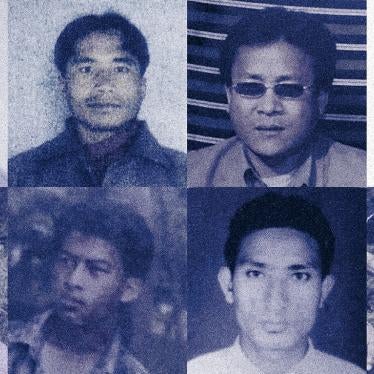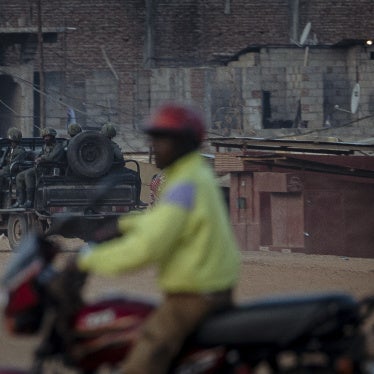(New York) – The Egyptian military has not investigated or prosecuted anyone for the sexual assault of seven women by military officers on March 10, 2011, in the military prison in Hikestep under the guise of “virginity tests,” Human Rights Watch said today. More than seven months later, military prosecutors also have failed to investigate adequately the other documented incidents of torture of those women and 13 others and of up to 170 men on March 9 on the grounds of the Egyptian Museum.
Samira Ibrahim, the only one among the seven women who filed a formal sexual assault complaint with the military prosecutor, told Human Rights Watch that she has received threatening anonymous phone calls. During the presidency of Hosni Mubarak, security forces often used such threats to intimidate victims or witnesses in connection with abuse complaints.
“Egypt’s military rulers are trying to cover up one of the most terrible abuses their forces committed this year,” said Joe Stork, deputy Middle East director at Human Rights Watch. “After the trauma of sexual assault, these women have been denied the protection of the law.”
This failure to investigate highlights the problems of the military justice system, in which the people investigating and prosecuting cases are within the chain of command and therefore not independent of those they are investigating. Human Rights Watch has called for all cases involving civilians, whether as victims or defendants, to be moved to civilian judicial authorities. The military justice system is insisting that it has sole jurisdiction over any complaints involving military officers, including the cases in October in which military vehicles mowed down Coptic protesters.
Human rights lawyers representing Ibrahim first filed a complaint on June 23 at the office of the military prosecutor. The deputy chief military prosecutor summoned Ibrahim three days later to take her testimony. On July 10, the prosecutor summoned the military doctor on duty at the military prison – a serving member of the military, who denied that the invasive procedure had taken place. Ibrahim’s lawyer, Ahmed Hossam, told Human Rights Watch that he was not allowed to attend that session.
Hossam said the military prosecutor then ordered military police to gather evidence at the military prison to prove or disprove Ibrahim’s complaint. Since then, Hossam told Human Rights Watch, whenever he has asked about the progress of the investigation, military prosecutors have told him that the results of the investigation by the military police at the prison “weren’t ready yet.”
Members of the Supreme Council of the Armed Forces (SCAF) have repeatedly denied that the virginity tests took place, including statements by Gen. Mohamed Assar and Gen. Ismail Etman on April 11, on the TV show Akher Kalam.
Yet on May 30, a SCAF general who did not wish to be named confirmed to CNN that the military had conducted the virginity tests.
“We didn't want them to say we had sexually assaulted or raped them, so we wanted to prove that they weren't virgins in the first place,” he said. “The girls who were detained were not like your daughter or mine. These were girls who had camped out in tents with male protesters in Tahrir Square, and we found in the tents Molotov cocktails and [drugs].”
On March 28, SCAF Statement No. 29 on the military’s official Facebook page said the military would “look into the truth of what was said recently” about “the torture of women arrested during the latest sit-in in Tahrir by military officers.” On June 6, a senior major general, a member of the SCAF, speaking of the virginity tests told Human Rights Watch, “We cannot confirm or deny that this happened because it is currently under investigation.” He went on to say that the SCAF had “issued instructions that this should not take place again.”
“Investigations before military prosecutors typically take a week or two at most before they are referred to court or closed, and judges often conclude trials after one or two sessions.” Stork said. “Seven months later we can conclude that the generals, despite their promises, have no intention to investigate or prosecute anyone for this criminal sexual assault.”
Human rights lawyers from the Hisham Mubarak Law Center, the Nadim Center for the Rehabilitation of Victims of Torture, and the Egyptian Initiative for Personal Rights have filed two cases on Ibrahim’s behalf before the Council of State, Egypt’s administrative court, to challenge the military’s lack of action. The first challenges the administrative decision to conduct the virginity tests in the military prison; the next session is scheduled for November 29. The second, against the administrative decision to refer the case filed by Ibrahim, a civilian, to a military court, will be decided on December 13.
Breakup of a Peaceful Sit-In
On the afternoon of March 9, soldiers and men in civilian clothing destroyed a tent camp belonging to demonstrators in Tahrir Square's central garden, where people had camped off and on since January 28. Military officers arrested at least 20 women, along with at least 174 men, took them all to the grounds of the Egyptian Museum where the military had set up a temporary base since the January protests, and tortured them. Human Rights Watch has documented how military officers beat, whipped, and kicked the men and beat the women, chained them to the iron fence, and gave them electric shocks. Rasha Azab, a 28-year-old journalist for Al-Fajr Weekly, told Human Rights Watch she was handcuffed to an outside wall in a museum courtyard:
They were kicking me in my stomach and hitting me with wooden sticks and slapping my face. They called me dirty names. At one point, one of them came and tied my hands even more tightly. I stood there for four hours. I saw dozens of men being dragged on the floor, being whipped. All of them were the people who had stayed in the square. I heard people screaming from inside the museum, and [the soldiers] said, “You should thank God you are not inside.”
The military released three of the women who had identified themselves as journalists but took 17 others, along with 157 men, to military base S28, which houses the military court. The soldiers kept the prisoners in buses overnight, moved them to the military prison in the morning, and took them before military courts that afternoon. After trials lasting not more than 30 minutes, the court sentenced all 17 of the women to suspended one-year sentences for “thuggery.” The military officers released them on March 11.
The Virginity Tests
It was at the military prison that the sexual assaults took place under the guise of virginity tests. Human Rights Watch interviewed Ibrahim and another victim, Salwa al-Hosseini, and reviewed the testimony of two others obtained by doctors at the Nadim Centre for the Rehabilitation of Victims of Torture. All four concurred in their statements that on the morning of March 10 two officers went into the prison cell holding the 17 women and asked them who among them was married and who was not. This is a euphemism used to determine whether a woman is sexually active, since many Egyptians consider extra-marital sex unacceptable on social and religious grounds.
Ibrahim told Human Rights Watch:
Two men in military uniform came into the cell. They asked us which of us was unmarried and then told the seven of us that they were going to examine us to see if we were really virgins. They took us out one by one. When it was my turn they took me to a bed in a passageway in front of the cell. There were lots of soldiers around and they could see me. I asked if the soldiers could move away and the officer escorting me tasered me. The woman prison guard in plain clothes stood at my head and then a man in military uniform examined me with his hand for several minutes. It was painful. He took his time. It was clear he was doing it on purpose to humiliate me.
Hosseini told Human Rights Watch:
When they first took us to the military prison the officer told the guards that we’d been arrested for prostitution. But when they brought us before the prosecutor later that day there were no charges related to prostitution. On Thursday morning the officers came in and said that they would check to see if we were virgins. They took me to a bed in the passageway and made me take off my trousers. The doctor used his fingers to check me. He was wearing a white jacket over his uniforms. There were around three or four soldiers behind him. When I asked them if a woman could examine me they said, “This is a doctor with a certificate.”
Ibrahim told Human Rights Watch that the day after she submitted the complaint she started receiving phone calls on her mobile phone from numbers that that were not shown. Numbers in Egypt show up on mobile phones, except those from security agencies such as General Intelligence or the former State Security Investigations bureau of the Ministry of Interior.
“Impunity for serious human rights abuses was a main cause of the January protests,” Stork said. “Samira Ibrahim should not have to fight the military now to protect her dignity and remedy this terrible violation.”
International Law
As party to the International Covenant on Civil and Political Rights and African Charter on Human and Peoples’ Rights, Egypt is obliged to protect women from cruel and inhuman treatment and discrimination, and to ensure their right to privacy. Coercive virginity tests violate all three of those obligations, Human Rights Watch said.
The virginity tests also violate guarantees of freedom from discrimination in the Convention on the Elimination of All Forms of Discrimination against Women (CEDAW), which is reflected in the March 30 Constitutional Declaration that acts as Egypt’s transitional constitution. The CEDAW Committee has previously stated that it views with the “gravest concern the practice of forced gynecological examinations of women … including of women prisoners while in custody.” The committee “emphasized that such coercive practices were degrading, discriminatory and unsafe and constituted a violation by state authorities of the bodily integrity, person and dignity of women.”
Conducting virginity tests without the informed consent of the girl or woman violates her right to bodily integrity, dignity, privacy, and equality before the law, and would amount to a sexual assault. Such assaults cannot be justified, being based on an intrinsically discriminatory presumption that an examination of female virginity can be a legitimate interest of the state. Under international law virginity tests committed in custody constitute cruel and inhuman treatment. These exams are painful, degrading, and frightening. Victims attest that being forced to undress and undergo exams is degrading both as a physical violation and for the threatened consequences, given their status as prisoners.
“The military cannot present itself as a credible guardian of a political transition unless it strictly applies the rule of law to its own conduct and fully investigates any abuses,” Stork said.






